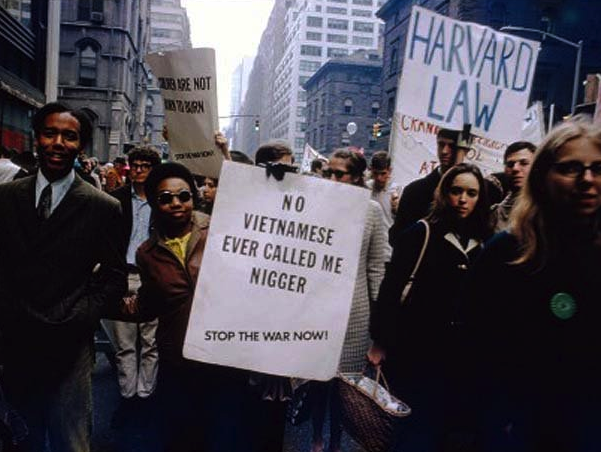Film Review: “Far From Vietnam” — A Remarkable Anti-War Film
Far From Vietnam dared say what no American documentary, even the most radical, would insinuate for fear of being accused of treason: in Vietnam, the Americans were the new Germans.
Far From Vietnam, directed by Jean-Luc Godard, Joris Ivens, William Klein, Claude Lelouch, Chris Marker, and Alain Resnais. At the Museum of Fine Arts, through October 3.
By Gerald Peary
The Vietnam War. It seemed a dreadful, immoral mistake then (I was a passionate campus protestor) and, in retrospect, the most blind, stupid American cause ever, with so many thousands of duped American soldiers and countless besieged Vietnamese sent for no reason at all to their graves. We’ve all moved on, but it all comes back vividly, frighteningly, with the restoration of a remarkable 1967 anti-war film, Far From Viet Nam. It’s the first time I’ve ever seen it.
A collaborative work of distinguished filmmakers–the Parisian “Left Bank” school of Alain Resnais, Agnès Varda, and Chris Marker joined by American expatriate William Klein, Holland’s Joris Ivens, and French directors, Jean-Luc Godard and Claude Lelouch—Far From Vietnam divided audiences at the 1967 New York Film Festival and then lasted a week in theatres. It was blasted both by critic Bosley Crowther in the Times and Andrew Sarris in The Village Voice. The distributor withdrew it and instantly retired it; and there was no video made available, a totally buried film.
It’s easy to see why this film was so loathed at its release, both for its difficult collage form, constructed and edited by Chris Marker (who also provided the voice-over), and for its ferociously anti-USA message.
That was a time, pre-Nixon, when most Americans still believed the US government and its flimsy reasons for involvement in Vietnam, and here was a film which more than politely questioned why we were there. Made by openly left-wing Europeans, it offered up the dirty reason: venal American imperialism, making war on the poor of the world, especially the revolutionary poor. Indiscriminately bombing the people of Vietnam to set an example to the world. Far From Vietnam dared say what no American documentary, even the most radical, would insinuate for fear of being accused of treason: in Vietnam, the Americans were the new Germans. A blaspheme? The modernist music used here mourning for the Vietnamese was lifted from Resnais’ elegiac WWII documentary, Night and Fog, music which memorialized the Jews being murdered at Auschwitz.
And another blaspheme? Far From Vietnam is not just a plea for Americans to withdraw their troops, the liberal position of much of the anti-war protest in America. It’s totally on the side of the North Vietnamese, for military victory over the Americans there. Whenever GI Joe is shown in Vietnam, he’s the hated Other. As for the North Vietnamese, whom we see up close in footage shot there by Ivens, they are brave, noble, and heroic, the traditional Maoist peasant heroes.
I wouldn’t think there would be a place in this film for director, Claude Lelouch, maker of insipid romantic comedies and fashion-ad cinema like the hideous A Man and a Woman. But the film begins with valuable reportage from Lelouch, who somehow got himself to Vietnam and filmed American military loading a cargo ship with bombs to be dropped over North Vietnam. Agnès Varda provides female voice-over (rare in 1967) for a brief history of the War, how America willingly took over from the French to ostensibly stop Communism in South East Asia. And there’s more women’s voice-over from French journalist Michèle Ray, who, embedded in South Vietnam, films the American army there while admitting she is rooting for the North to win the War!
Godard’s section is unusually personal and comprehensible for the maddeningly cryptic, evasive filmmaker. His head next to a 35mm camera, he explains in voiceover his frustration that working class people don’t go to his cinema. And he tells how his effort to go shoot in North Vietnam was stopped by the government there, who, denying him a passport, realized that his unorthodox political vision would not match what they wanted from foreign journalists. So he’s left “far from Vietnam” shooting a film about the Vietnam War. Ultimately, that’s all a filmmaker can do: film.
The finest sections of Far From Viet Nam are those shot in New York by William Klein, also an esteemed still photographer, and edited by Marker. This is brilliant street photography of a Veterans Day Parade, flanked by church leaders and city officials, and with rabid pro-War citizenry pushing us to “Support Our Boys in Viet Nam.” Later in the film, there is an anti-War march through the city, followed by a revelatory sequence of various New Yorkers arguing on the sidewalk about the efficacy of the War. The best of what we see is American democracy in action, with those of various positions all having their say. The worst is shrill and odious, an army of civilian, flag-waving Hawks, like Diane Arbus grotesques photographed in all their jingoistic awfulness by Weegee.
Gerald Peary is a professor at Suffolk University, Boston, curator of the Boston University Cinematheque, and the general editor of the “Conversations with Filmmakers” series from the University Press of Mississippi. A critic for the late Boston Phoenix, he is the author of 9 books on cinema, writer-director of the documentary For the Love of Movies: the Story of American Film Criticism, and a featured actor in the 2013 independent narrative Computer Chess.
Tagged: -Jean-Luc-Godard, Alain Resnais, Chris Marker, Claude Lelouch, documentary, Far From Vietnam, French cinema, Joris Ivens, Vietnam



David Gelernter — the Yale computer scientist best known for surviving an attack by Ted Kaczynski, aka the Unabomber — wrote that the indifference to the fate of the boat people, Vietnamese allied with the United States who were desperately fleeing Vietnam after the victory of the NLF and the Viet Cong, disenchanted him forever with the anti-war movement and the left of which it was a part. Gelernter has since made himself comfy with the right-wing Commentary crowd.
I don’t object to Gelernter expressing sympathy for the boat people. It’s often the case that the United States abandons short-term allies after this or that imperial adventure. It’s pretty much routine. I don’t object to “Last Days in Vietnam” quite as much as Gerald Peary does.
But I would like to remind the likes of David Gelernter that the real tragedy was the war itself. Compared to that, the fate of those trying to escape its consequences was — forgive me for how cold this sounds — secondary.
But I would like to remind the likes of David Gelernter that the real tragedy was the war itself — the 2-3 million Vietnamese dead, the 58,000 Americans. That puts the admittedly sad fate of the boat people in context.